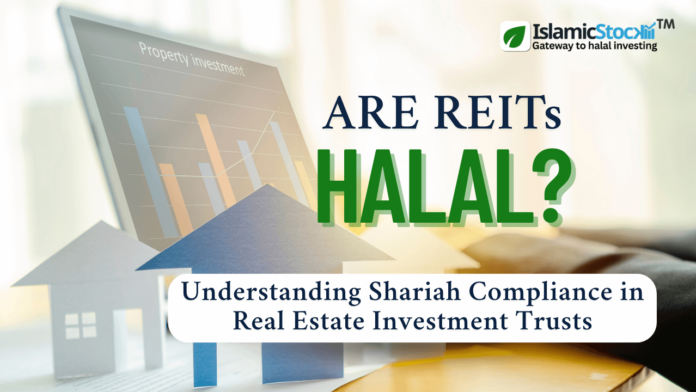
Real Estate Investment Trusts (REITs) offer investors an opportunity to invest in real estate assets without the need to directly own or manage properties. However, for Muslim investors, a critical question arises: Are REITs halal according to Shariah principles?
In this blog, we will explore the fundamentals of REITs, analyze whether REIT investments can be considered halal, and explain the key Shariah compliance factors that must be checked before investing in any Islamic REIT.
What Is a Real Estate Investment Trust (REIT)?
REITs are companies or trusts that own, operate, or finance income-producing real estate. They provide investors with regular income, similar to dividends from stocks, derived from rental income or the sale of properties. REITs allow investors to gain exposure to real estate markets without the need to buy, manage, or finance properties themselves. These trusts offer investors a steady stream of income, similar to dividends from stocks, which is primarily generated from rental income or the sale of properties within their portfolio. By distributing a significant portion of their taxable income to shareholders, typically around 90%, REITs provide investors with the potential for regular, reliable returns, often in the form of dividends.
REITs give individuals the opportunity to gain diversified exposure to real estate markets, a traditionally high-entry-barrier investment, with the added advantage of liquidity, as many REITs are publicly traded on major stock exchanges.
Shari’ah Compliance Criteria for REITs To determine whether a REIT is Shari’ah-compliant
Several key criteria must be met:
1.Permissible Income Sources: The primary source of income for the REIT must come from halal activities. This means rental income from residential, commercial, or industrial properties is permissible, but income from haram (prohibited) activities such as alcohol production, gambling, or interest-based financial services is not allowed.
2. Investment Properties Screening: The properties within the REIT’s portfolio must also comply with Shari’ah. Investments in properties used for haram purposes, such as casinos or establishments serving alcohol, are not permissible.
3. Financial Shari’ah Screening Criteria:
• Non-Permissible Income Ratio: The ratio of income from non-permissible activities should be within acceptable limits.
• Debt to Total Assets Ratio: The amount of debt relative to the total assets should be within acceptable limits.
• Illiquid Assets to Liquid Assets Ratio: The ratio of illiquid assets to liquid assets should be within acceptable limits.
• Net Liquid Assets: Net liquid assets should be less than the market capitalization.
• The non-compliant investment-to-total-assets ratio should be within permissible limits.
4. Shari’ah Supervisory Board: A Shari’ah-compliant REIT should have a dedicated Shari’ah supervisory board. This board is responsible for ensuring that all investments and operations adhere to Shari’ah principles. The board regularly reviews the REIT’s activities and provides guidance to maintain compliance. Investing in Shari’ah-Compliant REITs Investors seeking to invest in Shari’ah-compliant REITs should look for funds that explicitly state their adherence to Islamic principles. These REITs usually provide detailed information about their Shari’ah compliance processes and often feature certification from reputable Shari’ah scholars or boards. By meeting the criteria outlined above, REITs can offer a halal investment opportunity for Muslim investors, allowing them to diversify their portfolios while adhering to their religious beliefs.
Challenges in Finding Shariah-Compliant (Halal) REITs
Finding a fully Shariah-compliant REIT can be challenging because
Many REITs have mixed-use properties rented to both halal and haram businesses.
Most REITs use conventional, interest-based financing models.
Islamic REIT options certified by recognized Shariah boards are limited.
Thus, investors should either do detailed due diligence or prefer investing in REITs that have been certified as Islamic REITs by Shariah scholars.
Conclusion
Investing in real estate through REITs can be a viable option for Muslim investors, provided the REITs meet specific Shari’ah compliance criteria. Ensuring permissible income sources, maintaining proper investment property screening, adhering to financial Shari’ah screening criteria, and having a Shari’ah supervisory board are essential elements for a REIT to be considered halal. As always, investors should conduct their due diligence and seek guidance from knowledgeable Shari’ah scholars to ensure their investments align with their faith.



